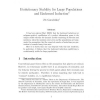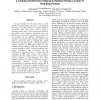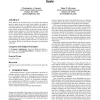277 search results - page 7 / 56 » A Model for Multiple Outcomes Games |
MOR
2006
13 years 8 months ago
2006
It has been shown (Hart [2002]) that the backward induction (or subgame-perfect) equilibrium of a perfect information game is the unique stable outcome for dynamic models consisti...
JDCTA
2010
13 years 3 months ago
2010
To gain insights into the neural basis of such adaptive decision-making processes, we investigated the nature of learning process in humans playing a competitive game with binary ...
ICDM
2009
IEEE
14 years 3 months ago
2009
IEEE
Abstract—It is now widely accepted that in many situations where classifiers are deployed, adversaries deliberately manipulate data in order to reduce the classifier’s accura...
ACMICEC
2007
ACM
14 years 18 days ago
2007
ACM
While diffusion of innovation topics in economics and majority games in game theory have been widely studied, the impact of economy-of-scale effects in aggregated decision making ...
CPC
2002
13 years 8 months ago
2002
Co-learning is a model involving agents from a large population, who interact by playing a fixed game and update their behaviour based on previous experience and the outcome of th...



